The blog will be taking a short break here, with two winter haiku (or really just very short poems).
Winter Haiku
morning hidden in fog:
a gift wrapped
in cool white tissue
torn wrapping paper
piled by the fireplace
the holiday’s over
The blog will be taking a short break here, with two winter haiku (or really just very short poems).
Winter Haiku
morning hidden in fog:
a gift wrapped
in cool white tissue
torn wrapping paper
piled by the fireplace
the holiday’s over
No, not Santa’s whiskers and the covers, but stuffing and the turkey. I’ve been making big holiday dinners for decades. Until I found and tested this recipe from the NY Times, I’ve always thought that stuffing had to be in the bird. It just didn’t have that special stuffing wonderfulness any other way. But since I tried this muffin cup stuffing, I’ve been a convert. It’s time consuming to make–takes over an hour to do the various things–but really worth it. I’m never going back. An extra plus: the bird cooks faster and more evenly without stuffing (sorry about the grease marks, they were well-earned):
Try it, it’s worth it.
Poets, like hemlines, go in and out of fashion. Poetic styles, too, have their day and then seem shopworn, archaic. For a long time, rhyme was out of style. Poets who rhymed with regularity, the whole cannon of them, were dismissed as too restricted. Free verse, experimental verse, anything but rhyme was in. But rhyme is seeping back. The simple pleasure of it has a charm that still holds. It may be slant rhyme–words that echo instead of chiming exactly; or internal rhyme that occurs in the middle of lines instead of at the ends; or simply irregular rhyming patterns, so the ear is tricked in its expectations.
One of the masters of the sly rhyme is Kay Ryan, who was recently US Poet Laureate. She writes small intricate poems, in which rhyme twists and turns around a point. They are compressed and original, and make you think. This poem especially pleases me, because it is about chickens–metaphorical ones, but chickens none the less:
The chickens
are circing and
blotting out the
day. The sun is
bright, but the
chickens are in
the way. Yes,
the sky is dark
with chickens,
dense with them.
They turn and
then they turn
again. These
are the chickens
you let loose
one at a time
and small–
various breeds.
Now they have
come home
to roost–all
the same kind
at the same speed.
Kay Ryan
You can hear her read it, if you like. The rhyme here seems straightforward to the ear: day/way (internal), time/home (slant), and finally small/all and breeds/speed, traditional line-end rhyme. The result is like a puzzle, and charms the ear. At the same time the message of the poem is compelling: you go bumbling along, doing one thing and then another, and then at some point, you see that you have made a certain kind of mistake over and over. Or at least, this is how I read it, and it resonates with me, a kind of soreness, a chagrin at my own actions.
Kay Ryan has a wonderful sense of humor, a dark wit, and a well-tuned poetic ear. Almost all her poems are short and accessible. Just now, she’s in fashion, though for a very long time she was not. Her newish selected poems, The Best of It, is the one I selected to take with me over the holidays–not too demanding, easy to pick up and dip into, and yet a book that makes you ponder.
In North Berkeley, tucked off Arlington Avenue across from the library, is a street called Rincon Road. If you turn onto it, after a few hundred yards you come upon an imposing gate, behind which is the Blake Garden created in the twenties by the wife of then UC President Anson Blake and Mabel Symmes, a landscape architecture student. Today it’s run by a conservancy and linked with the landscape architecture school at UC.
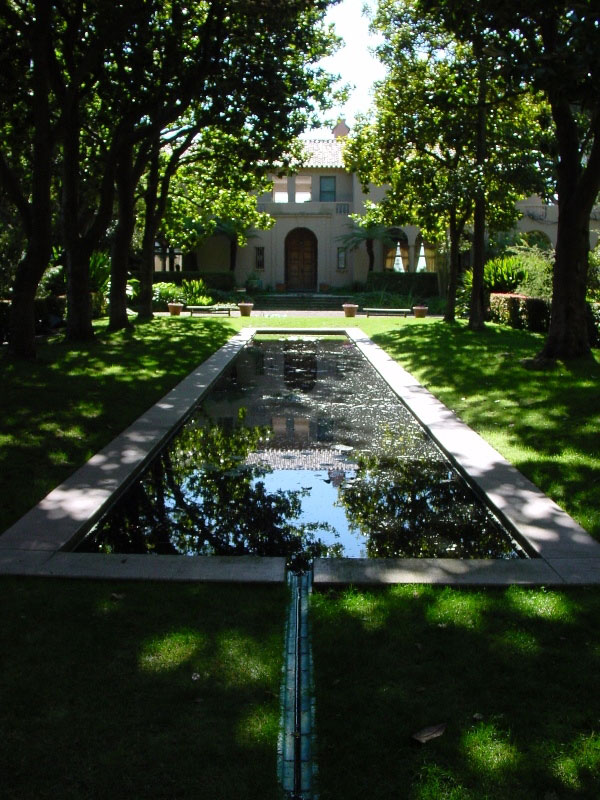 The garden is a wonderful mix of the formal–pillars, reflecting pool, and the whimsical (in the album below). On any non-holiday weekday, the gate opens at 8 am, and you can wander the woodland or grassy paths, look at the reflecting pool and the gardens, and see one of the ongoing projects the students create. It’s a wonderful amble any time of year, and right now there are some particularly entrancing projects to look at–the vegetable garden with its pole-bean teepee, a tule-grass canoe (where is baby Moses?), a sinuous reed tunnel for crawling through, a bamboo culvert to a water tank:
The garden is a wonderful mix of the formal–pillars, reflecting pool, and the whimsical (in the album below). On any non-holiday weekday, the gate opens at 8 am, and you can wander the woodland or grassy paths, look at the reflecting pool and the gardens, and see one of the ongoing projects the students create. It’s a wonderful amble any time of year, and right now there are some particularly entrancing projects to look at–the vegetable garden with its pole-bean teepee, a tule-grass canoe (where is baby Moses?), a sinuous reed tunnel for crawling through, a bamboo culvert to a water tank:
%%wppa%%
%%album=5%%
And it occurs to me that Stanley Kunitz, a former poet laureate of the US who lived almost to his 100th birthday, was also famous for his garden. He celebrated it in a book published about five years ago, The Wild Braid: A Poet Reflects on a Century in the Garden. My favorite poem of his, though, is about his father’s suicide and its impact on his life. I first heard this recited by Marie Howe: Continue reading “Blake Garden”
 Yes it’s today. Or actually, December 17 is the date of his baptism. In homage to this famously cranky individual, I thought I’d print a little rant on Cafe Gratitude, a Northern California restaurant chain.
Yes it’s today. Or actually, December 17 is the date of his baptism. In homage to this famously cranky individual, I thought I’d print a little rant on Cafe Gratitude, a Northern California restaurant chain.
Cafe Gratitude’s statement about itself says it’s “a collection of 100% organic vegan restaurants specializing in gourmet raw and cooked cuisines. Our cafes create gourmet dishes with organic produce from our very own farm in Vacaville, CA (Be Love Farm). We honor the earth as we honor ourselves and have created a menu that promotes consciousness and sustainability for both our well being and health as well as the planet and all of its inhabitants.” Apparently this doesn’t include the well-being of employees who are suing them. The cafes are allegedly closing because of labor violation lawsuits that are “too expensive to fight.”
Until yesterday, I’d never been in a Cafe Gratitude, but there happened to be one in the Oakland Whole Foods, and I ordered a cup of green tea. It turns out that they don’t have green tea, they have “I Am Glorious.” I could have had “I Am Eternally Blessed,” an espresso milkshake, or “I Am Enlivened,” the world’s only fresh algae from Klamath Lake, Oregon. You get the idea. Continue reading “Beethoven’s birthday”
 I recently gave what may be my last business presentation at a conference in Austin. It was about finding a sustainable career path, and I ended it with this poem by W. S. Merwin (last year’s US Poet Laureate). Continue reading “Marvelous Merwin”
I recently gave what may be my last business presentation at a conference in Austin. It was about finding a sustainable career path, and I ended it with this poem by W. S. Merwin (last year’s US Poet Laureate). Continue reading “Marvelous Merwin”
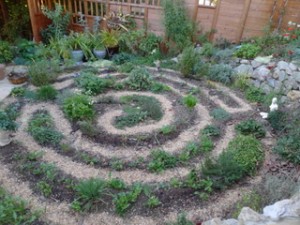 The weather here in Northern California has been wonderfully sunny and warm for the last week or so, giving me time to get the labyrinth ready for winter, take down old tomato vines, and get the beds ready for planting. For the labyrinth, I trimmed and added garlic and greens, along with new pebbles for the path.
The weather here in Northern California has been wonderfully sunny and warm for the last week or so, giving me time to get the labyrinth ready for winter, take down old tomato vines, and get the beds ready for planting. For the labyrinth, I trimmed and added garlic and greens, along with new pebbles for the path.
The tomato vines were a bigger challenge. There were a lot of them! And I had put off taking them down because there were still so many green tomatoes. But now the green ones are ripening on the window sill. It took me three afternoons to pile up all the vines, and then all day to put them through my wonderful Eco Shredder. The shredder is a great tool, and from three huge piles of dead vines, I have about a small garbage can full of wonderful fine green-brown mulch. I let the chickens out and they were very willing to help with the cleanup. They love to forage, and ate quite a bit of the shredded vines, even though they don’t like tomato plants normally.
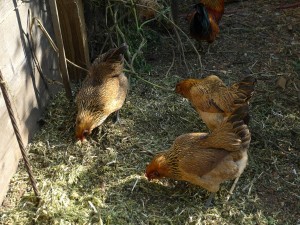 In any case, they were happy, I was happy, and the garden is almost ready for winter planting. My neighbor gave me some black fava beans and these should make a good cover crop.
In any case, they were happy, I was happy, and the garden is almost ready for winter planting. My neighbor gave me some black fava beans and these should make a good cover crop.
I was getting tired of the heading for the blog, and also have enough posts that some might want to browse by categories. Melissa Donovan whose skill, patience, and advice were so helpful in setting up the blog in the beginning, did the update last night. Hope you like it.
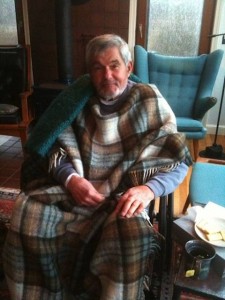 To inaugurate the new look, I want to share a poem by Deborah Friedman, one of the poets of Salon 77 and of my writing group. She’s been doing some terrific writing lately, mostly about her father, who died after a long fight with brain cancer. Here is his picture. Though the topic is dark, her poetry has been so tender and moving. When she read this to our group last Monday, I was sorely jealous.
To inaugurate the new look, I want to share a poem by Deborah Friedman, one of the poets of Salon 77 and of my writing group. She’s been doing some terrific writing lately, mostly about her father, who died after a long fight with brain cancer. Here is his picture. Though the topic is dark, her poetry has been so tender and moving. When she read this to our group last Monday, I was sorely jealous.
Looking this morning at Bob Ross’s website made me reflect again on the difference between creating art and the effort of getting one’s art known. I know so many truly talented people in whose work outshines most of what is generally known and praised. For me, these two areas, the work and the promotion of the work, are almost completely antithetical. When I’m writing well, I have no energy at all for “sending things out.” When it’s not going as well, I make desultory attempts to get things into print. As for Bob Ross, he lives on the north coast and has been sketching, painting, and making collages since the sixties.
I remember reading an interview with Bob years ago, I think it was in a publication of the Mendocino Art Center. Bob said something like, “You sit down and draw for a few hours every day for ten years, and you begin to get better at it.” By now Bob’s been doing this every day for decades, and his work is extraordinary. One of the oils (among many) that particularly charmed my eye is this rather formal nude with an asian influence, entitled Spring.
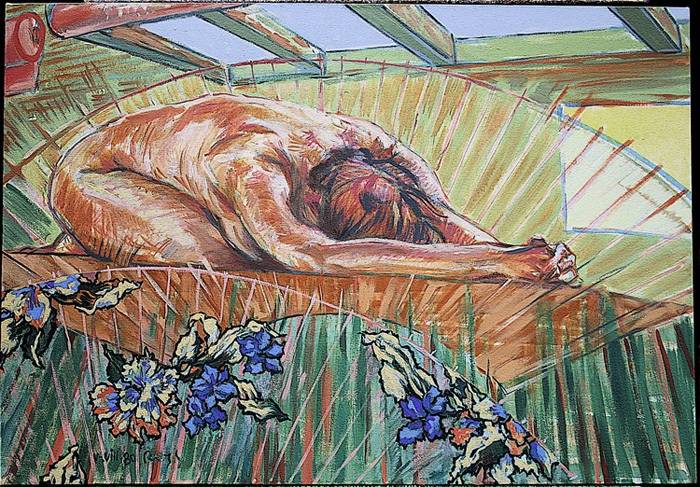 We’re lucky for the internet, where little known treasures can be ferreted out and enjoyed!
We’re lucky for the internet, where little known treasures can be ferreted out and enjoyed!
These two people have nothing in common, one a famous poet and teacher the other a renowned race car driver, except that I was reading first the obituary of Jim Rathmann in the NY Times this morning, and then Bob’s poem “Shame: an Aria.”
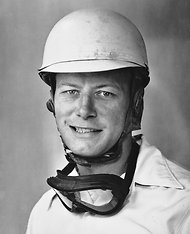 Larry was reading to me Jim Rathmann’s obituary over breakfast (vegetable hash–yummy–let me know if you want the recipe). He started racing before he was legally eligible, so used his brother James’ ID. Hence his career as Jim Rathmann, record breaking race car driver, whose given name was “Royal” but whose family name was Dick. It must have been confusing, as his older brother was a decent racer, too. The part Larry read was: “He earned renown in Southern California drag-racing circles, receiving 48 traffic tickets before he was 18 — four during one lunch break.” But my favorite part was the last paragraph of the article. He became friends with the astronauts, and one taught him to fly:
Larry was reading to me Jim Rathmann’s obituary over breakfast (vegetable hash–yummy–let me know if you want the recipe). He started racing before he was legally eligible, so used his brother James’ ID. Hence his career as Jim Rathmann, record breaking race car driver, whose given name was “Royal” but whose family name was Dick. It must have been confusing, as his older brother was a decent racer, too. The part Larry read was: “He earned renown in Southern California drag-racing circles, receiving 48 traffic tickets before he was 18 — four during one lunch break.” But my favorite part was the last paragraph of the article. He became friends with the astronauts, and one taught him to fly:
Gordon Cooper, one of the original members of NASA’s Mercury program, told him never to fly under a seagull lest the bird excrete on the plane. Rathmann made the mistake of laughing.
Colonel Cooper proceeded to prove his point, flying so low under a flock of gulls that a terrified Rathmann could hear the propellers cutting marsh grass. On landing, Cooper jumped from the plane and pointed to the spattered roof.
“I told you,” he said. Continue reading “Bob Hass and Jim (Royal Dick) Rathmann”
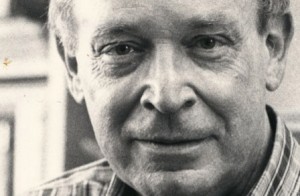 There are so many good poets who write in relative obscurity. Bill Dickey (whose poem I posted yesterday), was part of Berryman’s famous class at Iowa and taught poetry for over 30 years at San Francisco State. Don’t confuse Bill with another poet, James Dickey, who is very well known (and in my view a much lesser poet). Bill published 15 volumes of poetry, and was well thought of by fellow poets, but his work is almost unknown to the general public. Larry was lucky enough to study with him in 1968, and then again in the late 70s. He says of Bill: Continue reading “More about William Dickey”
There are so many good poets who write in relative obscurity. Bill Dickey (whose poem I posted yesterday), was part of Berryman’s famous class at Iowa and taught poetry for over 30 years at San Francisco State. Don’t confuse Bill with another poet, James Dickey, who is very well known (and in my view a much lesser poet). Bill published 15 volumes of poetry, and was well thought of by fellow poets, but his work is almost unknown to the general public. Larry was lucky enough to study with him in 1968, and then again in the late 70s. He says of Bill: Continue reading “More about William Dickey”